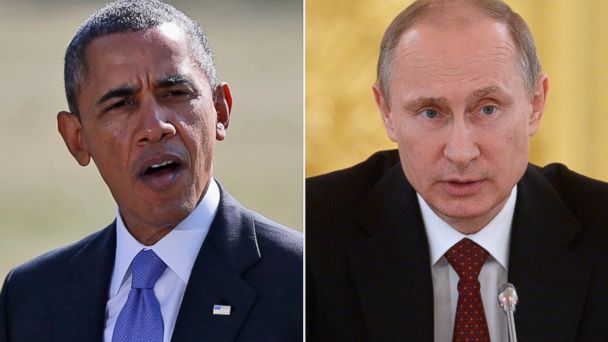US and Russia 'Closer' to Resolving Ukraine Crisis

(AP Photo)
MOSCOW - A day after Russian President Vladimir Putin surprised President Obama with a phone call to discuss a diplomatic solution to the standoff over Ukraine, there are signs that a deal might be on the horizon. Both sides publicly laid out positions, though they remain far apart on some issues.
"We are bringing our approaches closer together," Russian Foreign Minister Sergei Lavrov said in a Russian television interview. He added that "a possible joint initiative that could be offered to our Ukrainian partners is taking shape."
He also reiterated Moscow's claim that it has "absolutely no intention of and interest in crossing Ukraine's borders."
In a dramatic sign that at least a week of quiet talks between the United States and Russia might finally be coming to a head, Secretary of State John Kerry turned his plane around today on his way home from Saudi Arabia and will meet Lavrov in Paris on Sunday. The two spoke on the phone today.
A senior Obama administration official said the talks are focusing on the role of international monitors in Ukraine, Russia pulling back its forces from the border, and direct talks between Russia and Ukraine "supported by the international community." The official stressed that "we have been coordinating closely with the Ukrainians, including on this diplomatic proposal."
Foreign Minister Lavrov, however, said Russia had rejected a Western proposal to set up an international "contact group" that would, in his words, supervise the talks between Russia and Ukraine.
"This would be an absolutely unacceptable format, and we are not talking about this," he said in the interview.
Lavrov said Russia wants Ukraine's regions to have more autonomy, presumably because that would allow pro-Russian regions in the east to distance themselves from the new pro-Western government in Kiev. He suggested that the U.S. and its allies were now open to the idea as well.
"I can say that 'federation' is no longer a taboo word in our negotiations," he said.
Russia also wants guarantees written into Ukraine's new constitution, which will be drafted in the coming months, that it will never join NATO or any other alliance.
"We are convinced that a new [Ukrainian] constitution should unambiguously stipulate Ukraine's non-aligned status," Lavrov said in his television interview, according to Russia's Interfax news agency.
Taken together, Lavrov's remarks made clear that the Kremlin wants to ensure it will be able to influence events in Ukraine in the future, as well as prevent Kiev from drifting further into the West's arms.
The U.S., meanwhile, appears to have given up on Crimea and is more concerned about halting the immediate threat of Russian troops, tens of thousands of which have are said to have amassed along the border with Ukraine in recent weeks.
A White House statement on Friday's call between Obama and Putin spoke only about the need to protect Ukraine's "territorial integrity," but made no mention of Crimea, which Russia annexed from Ukraine earlier in the month.
If a deal is struck, both sides will have to overcome deep-seated mistrust.
In recent weeks, American officials have complained that Putin's words have not matched his actions, like an earlier promise not to send troops into Crimea. That unpredictability has caused anxiety about what Putin might do next. U.S. officials have indicated they'll want mechanisms to prevent Russian meddling in Ukraine in the future.
The Kremlin, meanwhile, is clearly unconvinced by Western promises that NATO will not expand into Ukraine and other former Soviet republics, areas that Russia still considers within its sphere of influence. After all, as the Soviet Union fell, NATO promised not to expand into eastern Europe, then did exactly that a few years later.
Earlier this week, Obama tried to reassure the Kremlin, telling reporters that "neither Ukraine or Georgia are currently on a path to NATO membership and there has not been any immediate plans for expansion of NATO's membership."
Yet those assurances have not swayed Russia's leaders.
"There should be no ambiguity here. There are too many 'so fars' and 'no intentions.' Intentions change, while facts are created on the ground," Lavrov said today.
Putin seems intent on maintaining the threat of military action as negotiations progress. In its statement on his call to Obama, the Kremlin noted the situation in the region of Transnistria, which, like Crimea, is home to many ethnic Russians and has long sought to break away from Moldova.